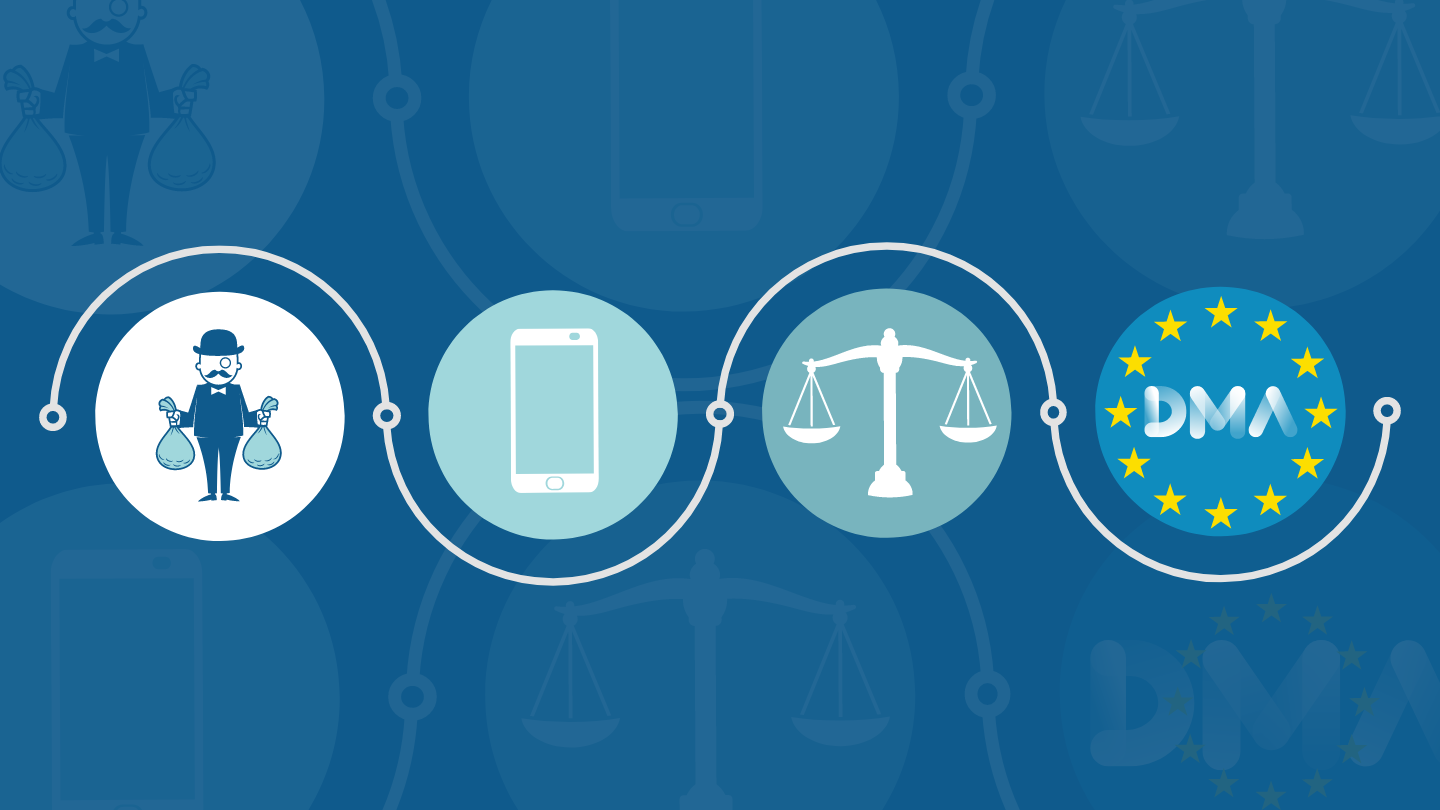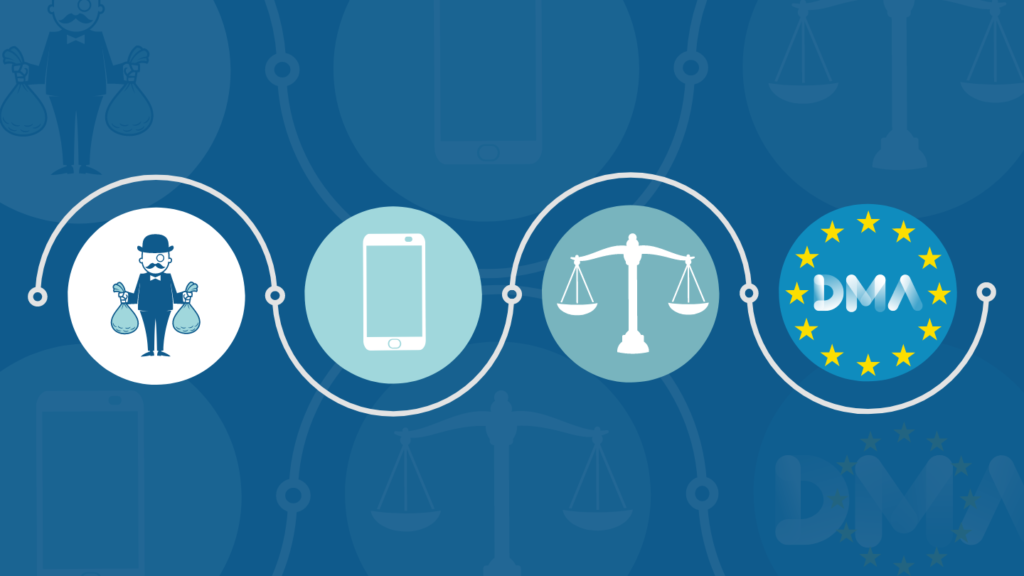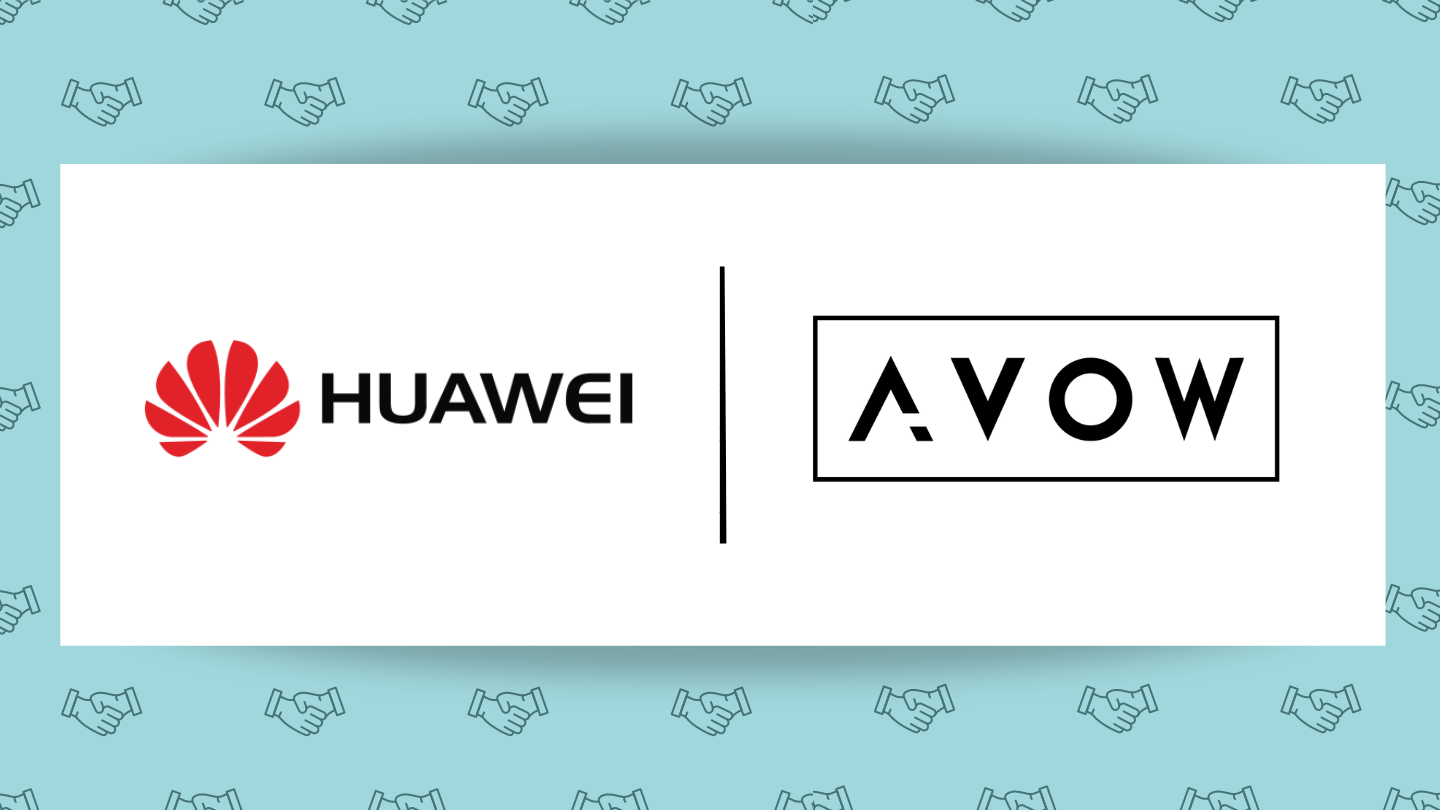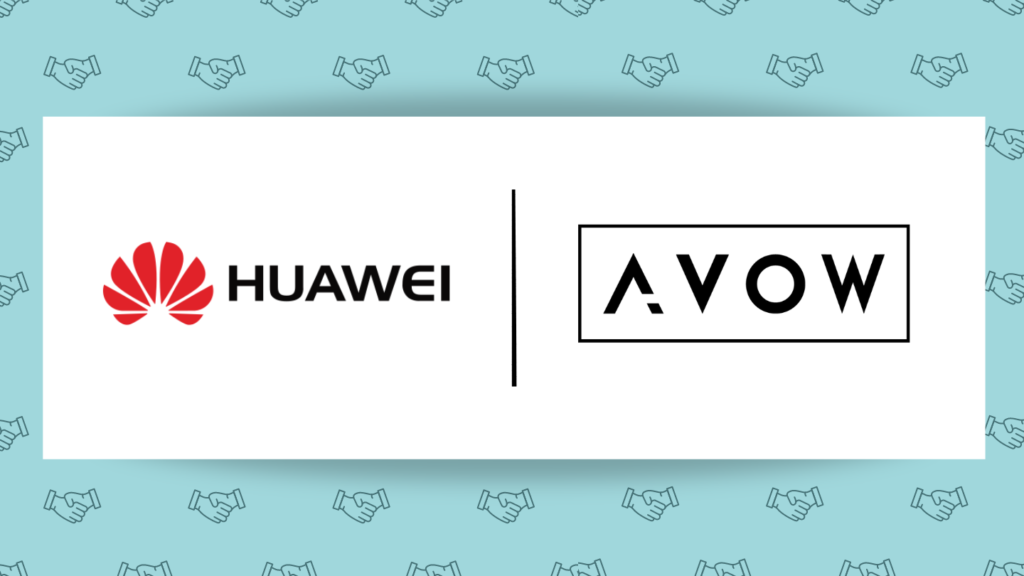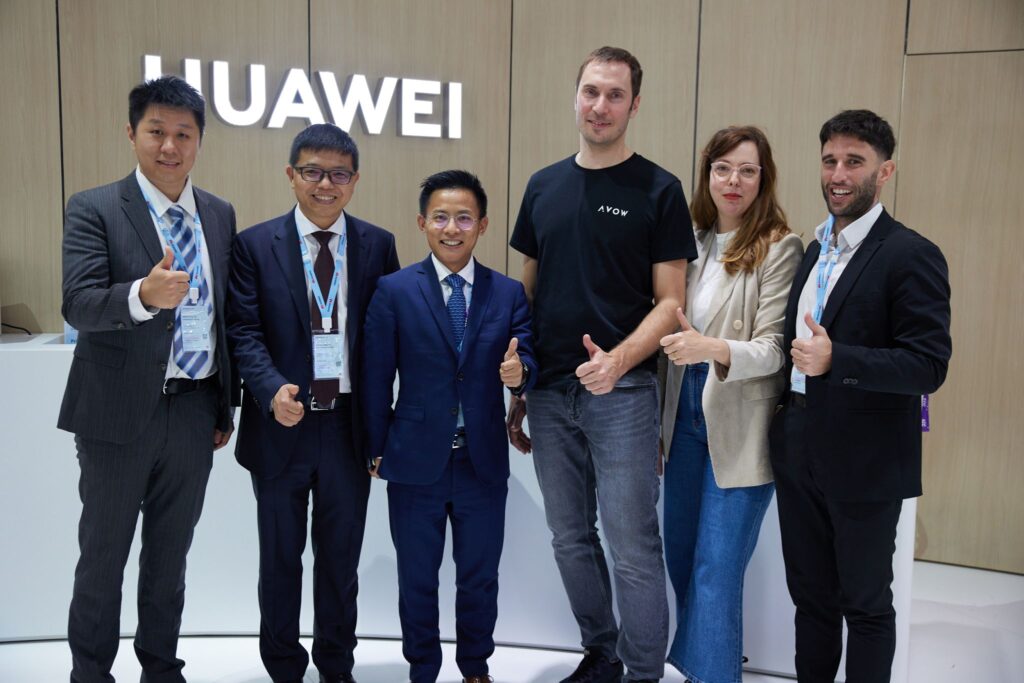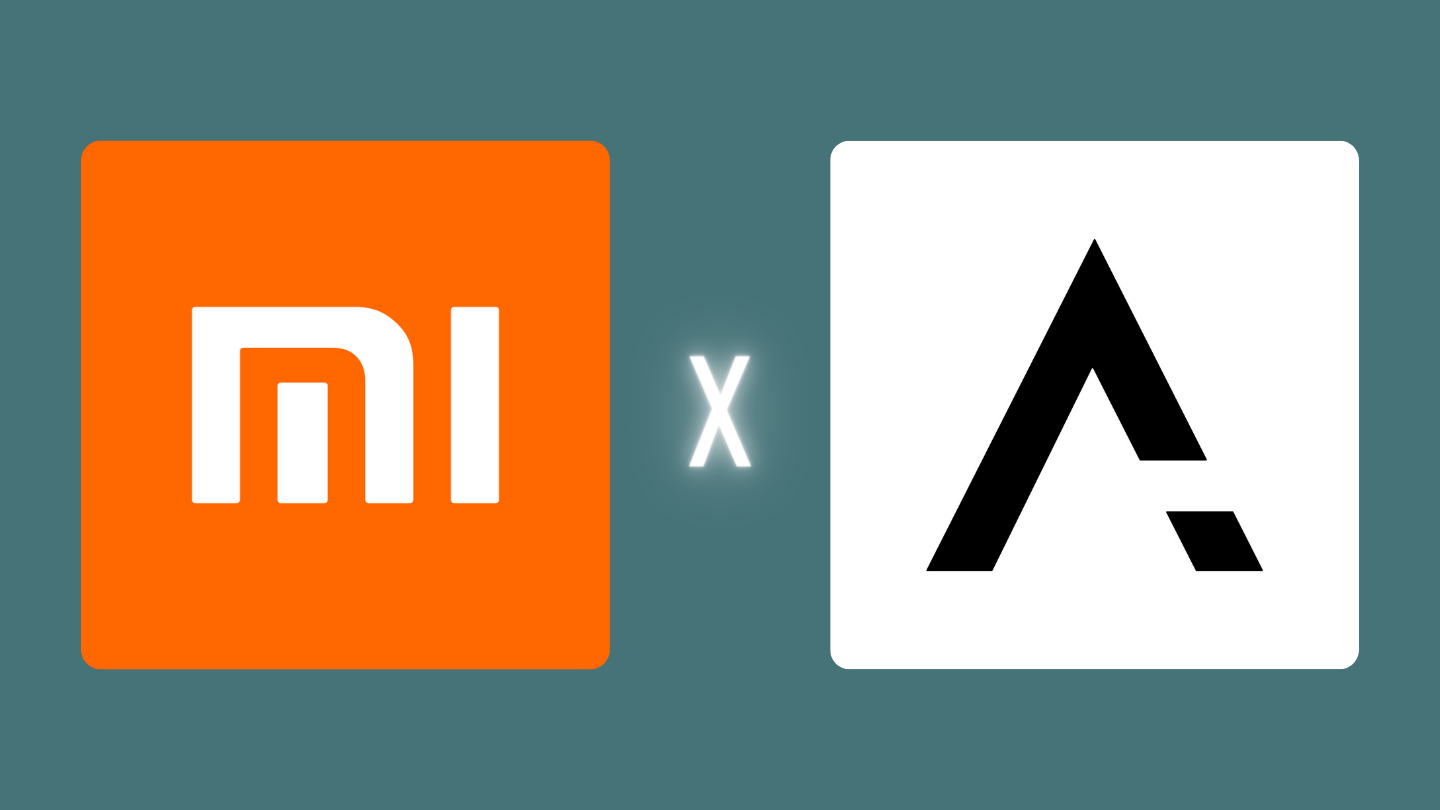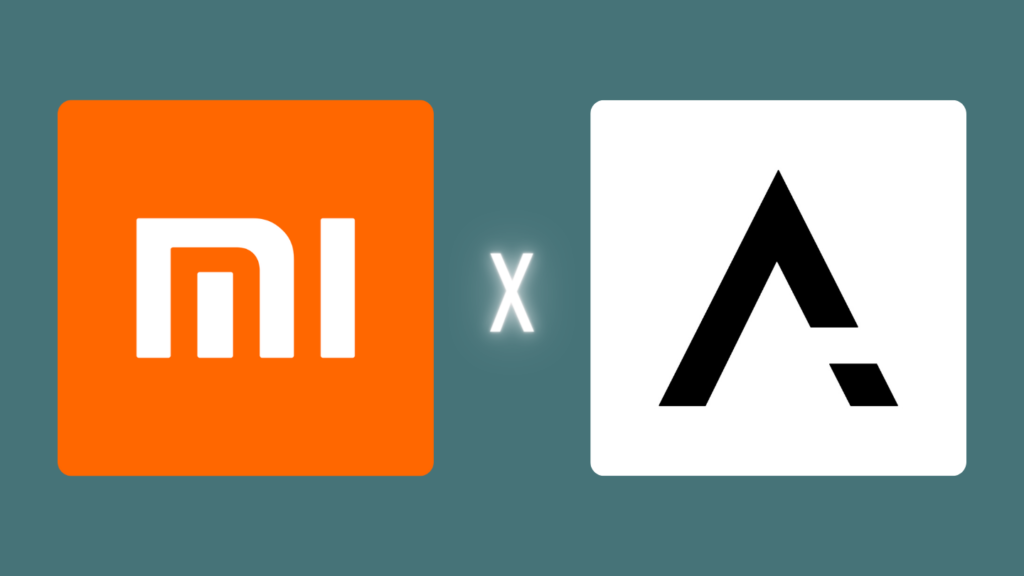Recapping the “Feast & Feisty” MWC Party in Barcelona with AVOW, OPPO and Xiaomi
Last week, we had the pleasure of hosting an exclusive MWC Party that blended the latest in mobile technology with an unparalleled culinary journey, setting a new standard for what networking events can be. The AVOW Feast and Feisty Supper Club, held in the heart of Barcelona at the iconic Montoya space, was not just an event; it was an experience, co-hosted with trusted OEM partners OPPO and Xiaomi, drawing a crowd of over 200 attendees from around the globe.
For those of you who were there, we hope this post brings back fond memories of the night. And for our friends who couldn't make it, we invite you to live vicariously through our recap and share in the excitement of what was truly a night to remember.
Feast and Feisty - A Culinary Adventure Like No Other
Upon arrival, our Feast and Feisty guests were welcomed into a world where innovation meets indulgence. The culinary journey we embarked on was inspired by the vibrant flavors of local cuisine, each dish telling a story of Barcelona's rich culinary heritage. Paired with top-tier drinks, the feast was not just a treat for the taste buds but a testament to the art of food and drink.
Celebrating Innovation with Industry Giants at our MWC Party
Co-hosting the Feast and Feisty event with mobile OEMs OPPO and Xiaomi added an extra layer of excitement, bringing together leaders, innovators, and enthusiasts from the mobile technology sector. It was more than just a blast; it was an opportunity to connect with the minds shaping the future of our industry. The presence of these mobile giants underscored the event's significance as a hub for networking and collaboration, highlighting the importance of coming together to celebrate and drive forward the advancements in our field.
Looking Forward to Future Feast and Feisty Adventures
As we reflect on the success of this MCW party, we're reminded of the power of bringing people together to share in the celebration of innovation, culture, and culinary excellence. To those who were there, thank you for making the night unforgettable. And to those who couldn't join us, we missed your presence and hope to welcome you at our future events.
This special Feast and Feisty night at MWC Barcelona 2024 was a testament to what we at AVOW, along with our esteemed partners OPPO and Xiaomi, believe in: pushing boundaries, fostering connections, and celebrating the incredible advancements in our industry. We look forward to continuing this journey with all of you, bringing more moments of innovation, networking, and celebration.
Stay tuned for our next adventure!
Interested in expanding your app through mobile OEM advertising? Leverage our expertise and partnerships with Xiaomi, Oppo, and other leading mobile OEMs. Contact the AVOW team today to explore how we can help you grow your mobile business.
Timeline of the Digital Markets Act (DMA): A Path Towards Tech Freedom and Consumer Choice
Update (March 22, 2024): Added information regarding the U.S. Department of Justice filing an antitrust lawsuit against Apple, citing concerns over monopoly practices.
In the ongoing saga of Big Tech regulation, the Digital Markets Act (DMA) looms large as a pivotal chapter in this story. This legislation, with its March 6, 2024 deadline set by the DMA in Europe, represents a significant milestone in targeting tech giants like Google and Apple. This urgency is underscored by the current market dynamics, where in the US, Apple commands a staggering 61% of the smartphone market, while globally, Android accounts for 72% of all operating systems.
As a result of the EU’s decision, that future now looks brighter than ever. But how did we get here? In this article, we delve into the journey toward the DMA, focusing on the timeline toward mobile-centric tech freedom and consumer choice.
Chronological Timeline: The Journey to DMA
This chronological timeline charts the evolution of regulatory and market responses to monopolistic practices in the tech industry, tracing the journey from early critiques of monopolies in the 18th century to the landmark implementation of the Digital Markets Act (DMA) in the 21st century, highlighting key developments in antitrust actions against tech giants like Apple and Google, the rise of smartphone ecosystems including mobile OEMs and alternative app stores - plus current global efforts to ensure fair competition and consumer choice.
First, let's dust off the history books and go all the way back to the late 1700s.
-
18TH CENTURY
The Early Critique of Monopolies
Monopolies are nothing new. As modern commerce began to expand in the 18th century, people such as the English economist Adam Smith were already railing against them. “The freer and more general the competition” of commercial entities, Smith inveighed in The Wealth of Nations (1786), the more societies are able to avail themselves of the “advantageous” perks of competitive trade.
-
19TH CENTURY
Government's Response to Monopolies
A significant milestone was when governments began to intervene against monopolistic practices. The UK's 1846 Corn Laws targeted agricultural monopolies, and the US's 1890 Sherman Antitrust Act tackled broader commercial monopolies. These laws laid the groundwork for future antitrust regulation.
-
1982
Antitrust Action Against AT&T and IBM
In 1982, the Sherman Antitrust Act was invoked against American Telephone & Telegraph Company (AT&T) and IBM by the Department of Justice, marking a significant challenge against monopolistic practices. While the case against IBM was eventually dropped after a 13-year investigation, the scrutiny had a lasting impact on its business operations.
-
JANUARY 2007
The iPhone Unveiling and the Dawn of the Smartphone Era
In 2007, Steve Jobs unveiled the iPhone, igniting the smartphone revolution. Smartphones were envisioned to merge cell phones with PC power, aiming to liberate consumers. However, Apple and Google's dominant app stores hindered this potential by charging high fees, restricting alternative options, and limiting consumer choice.
-
JULY 2008
Apple App Store Launched
A year after the iPhone's debut, Apple launched the App Store, revolutionizing app distribution. From the outset, Apple imposed control with a comprehensive software developer kit (SDK) and strict review guidelines - establishing Apple's dominant regulatory role.
-
OCTOBER 2008
Google Play Store Launched
On October 22, 2008, Google rolled out the Google Play Store, then known as the Android Market, fundamentally changing app distribution for Android users. This move not only expanded app accessibility but also set the stage for Google's dominance in the digital marketplace. By centralizing app distribution, Google positioned itself at the heart of Android's ecosystem.
-
SEPTEMBER 2009
Samsung Joins the App Store Market
In late 2009, Samsung launched Samsung Apps, later rebranded as Samsung Galaxy Store, to provide its users with a platform for accessing apps tailored specifically for Samsung devices.
-
NOVEMBER 2014
Xiaomi Launches International App Store
Chinese mobile manufacturer Xiaomi opened up an international app store initially catering to developers from Hong Kong, Taiwan, and Singapore, before gradually expanding to include other countries in subsequent years. During this period, the app store averaged an impressive 50 million downloads per day.
-
MID-2010’s
The Rise of OEM Alternative App Stores
In the mid-2010’s, mobile OEMs Vivo and Oppo launched their own alternative app stores to differentiate their offerings, enhance user experience, and retain customers within their ecosystem. By establishing these platforms, they aimed to provide curated apps and services tailored to their hardware, increasing brand loyalty and competitive edge against both traditional app marketplaces and other OEMs.
-
OCTOBER 2017
The Demise of Windows Phone OS
Once considered a viable alternative to Apple and Google in the early to mid-2010s, the Windows Phone OS meets its end. Despite initial promise, Windows Phone struggled to compete with the dominant iOS and Android platforms, ultimately leading to its demise.
-
MARCH 2018
AVOW Arrives: Vows to Revolutionize Mobile Marketing Outside the Mainstream
Driven by the need to enhance the mobile ecosystem and its marketing and advertising, AVOW was launched to support app developers and mobile brands outside the mainstream with smart, sophisticated marketing strategies. Recognizing that mobile OEMs and alternative app stores are the future, particularly in response to the monopolies held by Apple and Google's app stores - offering people choice in the mobile landscape.
Fast forward to today, AVOW connects app developers and mobile brands to an untapped audience of over 1.5 billion daily active users (DAU), facilitated through partnerships with major global Mobile OEMs like Huawei, Xiaomi, Vivo, and Oppo. AVOW’s integrated mobile OEM partners cover 54% of the global Android market, ensuring extensive reach and unprecedented opportunities for growth.
-
APRIL 2018
Global Release of Huawei AppGallery
Initially launched in China in 2011, AppGallery, Huawei's official app distribution platform, expanded globally in April 2018. Alongside other future mobile OEM app stores or alternative app stores, it was designed to provide users and app developers with a diverse selection of applications tailored for Huawei devices - offering an alternative to the app store monopoly dominated by Google and Apple.
-
JULY 2018 & MARCH 2019
EU Commission's Action Against Google
In 2018 and 2019, the European Commission took significant action against Google, imposing fines of €4.34 billion in July 2018 and €1.49 billion in March 2019 for anti-competitive practices. These fines underscored the heightened regulatory scrutiny on tech monopolies within the EU.
-
MAY 2019
Huawei Banned in the USA, Prompting AppGallery Advancements
In May 2019, Huawei faced a ban in the US initiated by the Trump administration, restricting the Chinese company’s access to American technologies, notably Google services like Android. This spurred Huawei to intensify efforts to enhance its AppGallery, focusing on improving developer support, expanding available apps, and prioritizing security measures. Despite these challenges, Huawei's proactive approach led to notable enhancements in AppGallery's functionality, solidifying it as a credible alternative app store.
Additionally, this ban influenced other OEMs to explore and invest in their own app ecosystems as a precaution against similar restrictions.
-
JANUARY 2020
Bye-Bye, Blackberry
In January 2020, BlackBerry, a once-prominent smartphone manufacturer known for its secure messaging services and physical keyboards, announced its closure. This move further consolidated the smartphone platform landscape, leaving Apple and Google as the sole mainstream options for consumers.
-
JULY 2020
EU Commission's Call to Action: Setting the Stage for the DMA
In July 2020, the European Commission launched a public consultation to gather opinions on potential issues needing EU-level intervention, laying the groundwork for what would evolve into the Digital Markets Act (DMA).
-
AUGUST 2020
Epic Games Challenges the Status Quo
In August 2020, Epic Games initiated lawsuits against Apple and Google, invoking the Sherman Antitrust Act. The legal challenges targeted the tech giants' app store policies and payment systems, aiming to disrupt the established norms and practices governing app distribution and monetization.
-
DECEMBER 2020
European Commission Proposes the Digital Markets Act
In December 2020, approximately five months after the conclusion of the public consultation launched by the European Commission, the formal proposal for the Digital Markets Act (DMA) was presented by the European Commission in Brussels, Belgium. This proposal aimed to address concerns about the market dominance of Google and Apple, as well as to promote fair competition and consumer choice.
-
MAY - SEPTEMBER 2021
Epic Games v. Apple
In this high profile lawsuit, Epic Games challenged Apple's 30% commission on in-app purchases, arguing that it constituted an unfair monopoly. The court's verdict was mixed, with some rulings favoring Apple and others favoring Epic Games.
-
JULY 2022
DMA Approved
During a full meeting of the European Parliament in July 2022, the DMA received overwhelming approval. Additionally, the Council of the European Union, representing member states, endorsed the legislative text. These steps marked the final stages in the approval process for the DMA.
-
OCTOBER 2022
DMA Published in EU Official Journal
On October 12, the final text of the DMA law was published in the Official Journal of the European Union making it an official legal document.
-
NOVEMBER 2022
Digital Markets Act Becomes Law in the EU
The EU proposed the DMA in July and passed it into law on November 1, 2022. This law aimed to limit the power of major tech companies and encourage competition.
EU commissioner Thierry Breton expressed the significance of this milestone, stating, “More choice for consumers, fewer obstacles for smaller competitors: the DMA will open the gates to the Internet. It was high time that Europe set the rules of the game upfront to ensure digital markets are fair and open.”
-
MAY 2023
Most of the DMA Became Applicable
On May 2, 2023, the DMA Implementing Regulation officially came into effect, marking the day when the DMA became applicable across the European Union.
-
JULY 2023
Gatekeeper Threshold Notification Under DMA
On July 3, 2023, the Digital Markets Act (DMA) required potential gatekeepers to notify the Commission if they meet specific thresholds outlined in Article 3 of the DMA. These thresholds include factors such as annual turnover (€7.5 billion or more), number of active monthly users (more than 45 million), and market position (met the criteria in each of the previous three financial years).
-
SEPTEMBER 2023
European Commission Designates 6 Gatekeepers, Including Apple and Google
On September 6, 2023, the European Commission identified six gatekeeper companies mandated to comply with the European Digital Markets Act by March 6, 2024. These gatekeepers are Alphabet (Google), Amazon, Apple, ByteDance, Meta (Facebook), and Microsoft.
-
JANUARY 2023
Apple's Concessions and DMA Compliance Measures
Following an investigation into its app store practices by the EC that began in 2021, Apple conceded this January to give its rivals in Europe access to its contactless payment system. Moreover, at the same time as Apple announced that it would divide its app store in two in order to conform with the DMA.
-
NOVEMBER - DECEMBER 2023
Epic Games v. Google
Initiated back in August 2020, Epic Games, the creators of Fortnite, accused Google of monopolistic practices on its Google Play Store. After a jury trial in November and December 2023, the jury found Google guilty on all counts, ruling that its actions violated antitrust laws by maintaining the Play Store as the dominant storefront with Android. This verdict was a significant win for fair competition advocates in the mobile app ecosystem.
-
MARCH 6, 2024
DMA Deadline Day!
In March 2024, tech giants faced a critical deadline to fully comply with the regulations outlined in the Digital Markets Act (DMA). By this deadline, they must have implemented a series of behavioral obligations, which profoundly shape their business policies, and refrain from engaging in any anti-competitive practices.
-
MARCH 21, 2024
U.S. Department of Justice Files Antitrust Lawsuit Against, Citing Monopoly Concerns
The U.S. Department of Justice (DoJ), along with 16 other state and district attorneys general, filed a landmark antitrust lawsuit against Apple. The lawsuit accuses Apple of illegally maintaining a monopoly over smartphones, significantly affecting various aspects, including the security and privacy of users, especially when messaging non-iPhone users.
The complaint specifically states: "Apple wraps itself in a cloak of privacy, security, and consumer preferences to justify its anticompetitive conduct," and "Apple deploys privacy and security justifications as an elastic shield that can stretch or contract to serve Apple's financial and business interests."
-
MAY 6, 2024
DMA Rules Reviewed by EU
The European Commission is required to review the rules and report to the parliament, council, and the Economic and Social Committee on any changes to be made.
-
2024 AND BEYOND
The World Won’t Wait
The DMA implementation heralds a fairer digital marketplace, likely influencing global regulations. Unsurprisingly, other countries are following suit.
- South Korea: In 2021, South Korea passed legislation limiting Apple and Google’s control over app-store payments.
- India: In 2022, India's Parliamentary Standing Committee on Commerce proposed DMA-style regulations.
- United Kingdom: The UK government has tabled a “pro-competition” Digital Markets Bill.
- United States: The US Senate is set to consider the American Innovation and Choice Online Act, both of which are comparable to the DMA. Additionally, the US Justice Department is nearing the conclusion of an investigation into Apple, potentially leading to further antitrust action.
The DMA Takeaway
As countries worldwide respond to the challenges posed by digital monopolies, the DMA serves as a catalyst for change, paving the way for a more equitable digital future.
The takeaway from this, however, isn’t that successful companies are bad. On the contrary, as Thierry Breton highlighted, it’s about consumer choice and allowing competition so that there can be more successful companies—not fewer. The world needs big brands. But it also needs smaller companies to achieve scale so that industry and technology can progress. Previously, this just wasn’t possible. But with the DMA’s support, hopefully this will now be the direction of travel elsewhere too. After all, if the EU can get it, why not the world?
Journey Towards DMA: Timeline at a Glance
- 18th Century: Early Critique of Monopolies by Adam Smith in "The Wealth of Nations" (1786).
- 19th Century: UK's Corn Laws (1846) and US's Sherman Antitrust Act (1890) target monopolies.
- 1982: Antitrust action against AT&T and IBM by the Department of Justice.
- Jan 2007: iPhone unveiled by Steve Jobs, sparking the smartphone era.
- Jun 2007: Release of the first iPhone.
- Jul 2008: Apple App Store is launched.
- Oct 2008: Google Play Store is launched (then known as Android Market).
- Sept 2009. Samsung Galaxy Store is launched (then known as Samsung Apps).
- Nov 2014: Xiaomi launches international app store.
- Mid-2010’s: Rise of Alternative App Stores - including Vivo and Oppo.
- Oct 2017: Demise of Windows Phone OS.
- Mar 2018: AVOW arrives, aiming to revolutionize mobile marketing outside the mainstream.
- Apr 2018: Global release of Huawei AppGallery.
- July 2018 / March 2019: EU Commission fines Google for anti-competitive practices.
- May 2019: Huawei banned in the US by the Trump administration.
- Jan 2020: BlackBerry announces its closure.
- July 2020: EU Commission launches public consultation for DMA.
- Aug 2020: Epic Games sues Apple and Google, citing the Sherman Antitrust Act.
- Dec 2020: European Commission proposes the Digital Markets Act.
- May - Sept 2021: Epic Games v. Apple lawsuit.
- Jul 2022: DMA receives approval from the European Parliament.
- Oct 2022: DMA published in EU Official Journal.
- Nov 2022: Digital Markets Act becomes law in the EU.
- May 2023: Most DMA regulations become applicable.
- Jul 2023: Gatekeeper threshold notification under DMA.
- Sept 2023: European Commission designates 6 gatekeepers including Apple and Google.
- Jan 2023: Apple makes concessions for DMA compliance.
- Nov - Dec 2023: Epic Games v. Google jury trial finds Google guilty of monopolistic practices.
- Mar 6, 2024: Deadline for tech giants to comply with DMA regulations.
- Mar 22, 2024: US DOJ sues Apple over monopoly and messaging security.
- May 6, 2024: EU to review DMA rules.
- 2024 and Beyond: Global influence of DMA with similar actions in South Korea, India, the United Kingdom, and the United States.
With Google Play and the Apple Store’s monopolies almost certainly coming to an end, alternative app stores and mobile OEMs are not just the future, they are the now, offering unprecedented opportunities for app developers and mobile brands. Contact our team today to unlock the potential of mobile OEM advertising.
AVOW and Huawei Strengthen Ties with New Partnership at MWC 2004
At this year's Mobile World Congress (MWC) in Barcelona, an important partnership was solidified, marking a significant stride in collaboration between AVOW and Huawei. In a private signing ceremony attended by Ning Shenglan, President of Huawei Consumer Cloud Service Global Ecosystem Development & Sales Dept, and Shan Xuefeng, Managing Director of Huawei Consumer Cloud Service Europe Ecosystem Development & Sales Dept, both organizations committed to a future of shared growth and innovation.
This memorandum, symbolizing a milestone in our relationship, builds on more than three years of teamwork with Huawei's Petal Ads team. It's a testament to our collective efforts to bring superior solutions and experiences to users and clients across the globe.
Robert Wildner, CEO-Chief Executive Officer of AVOW, emphasized the significance of this ceremony, stating, "This ceremony shows our commitment to Huawei in pursuit of countless opportunities for innovation and growth."
"Our strengthened bonds with both organizations symbolize the merging of our unique expertise, laying the groundwork for initiatives that will shape the future," shared Ning Shenglan, President of Consumer Cloud Service Global Ecosystem Development and Sales Department.
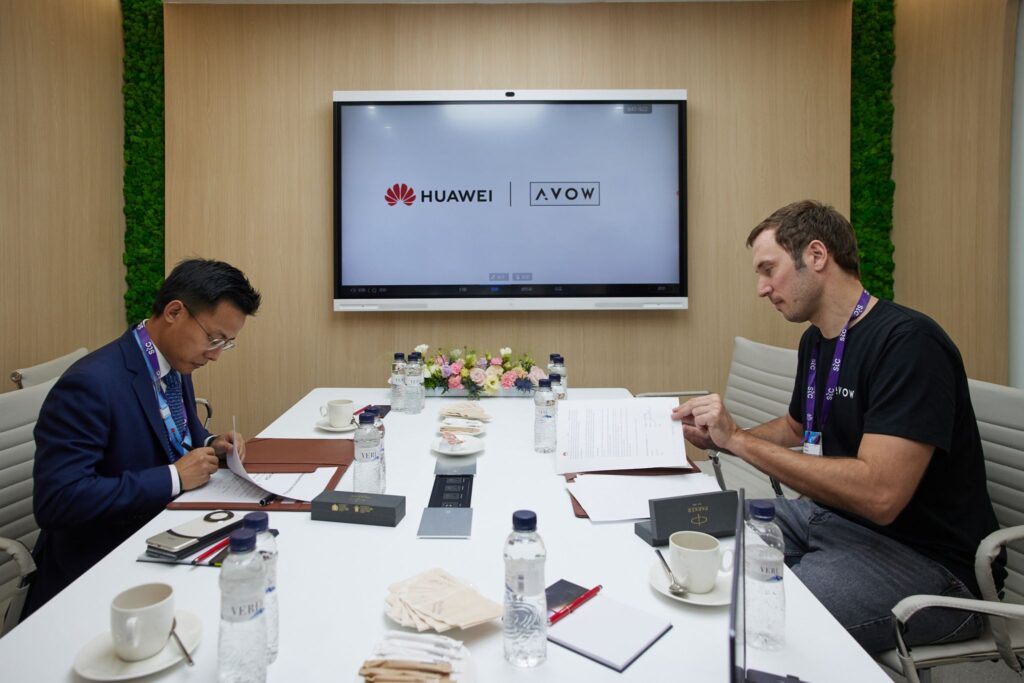
Huawei, a giant in the mobile OEM space, brings unparalleled technological strength to this partnership. With over 50 thousand games and a user base exceeding 230 million gamers, Huawei AppGallery remains committed to releasing high-quality apps that offer novel experiences to users worldwide, upholding its reputation as a premier alternative app store. Together with AVOW's innovative approach, this collaboration is poised to unlock new possibilities in mobile technology, enhancing the ecosystem for users everywhere.
As we embark on this journey, we look forward to a future rich with opportunity and innovation. This partnership between AVOW and Huawei is not just about strengthening our cooperation but about setting new benchmarks in the industry and in mobile OEM advertising.
Stay tuned for exciting developments as we continue to push the boundaries together.
Interested in growing your app with Huawei and leveraging our expertise? Contact us today to tap into our partnership with Huawei and other mobile OEMs.
AVOW Named 2024 Global Core Agency by Xiaomi MiAds at MWC 2024
At the recent Mobile World Congress (MWC) event in Barcelona, AVOW proudly announced its selection as a 2024 Global Core Agency by Xiaomi MiAds, marking this the third year in a row as a Global Core Agency, following successful partnerships in 2022 and 2023. This signifies a significant milestone in our ongoing collaboration with with the global smartphone manufacturer, reflecting the trust and confidence placed in AVOW by Xiaomi.
As the Global Core Agency, AVOW is poised to redefine user growth and customer success solutions in the mobile market. Leveraging Xiaomi's extensive user base and AVOW's expertise, we will orchestrate comprehensive mobile advertising campaigns on Xiaomi's Ad Platform, covering app launches, preload campaigns, media buying, and campaign optimization.
With Xiaomi's MiAds platform reaching over 410 million quality active users, AVOW is primed to drive exceptional results and sustained growth for our clients. This partnership highlights AVOW's dedication to innovation in mobile OEM user acquisition, providing marketers unmatched access to Xiaomi's vast global user base. We're excited about this next phase of collaboration and its potential to enhance mobile advertising standards.
Interested in scaling your app with Xiaomi and leveraging our expertise? Contact us today to tap into our partnership with Xiaomi and other mobile OEMs
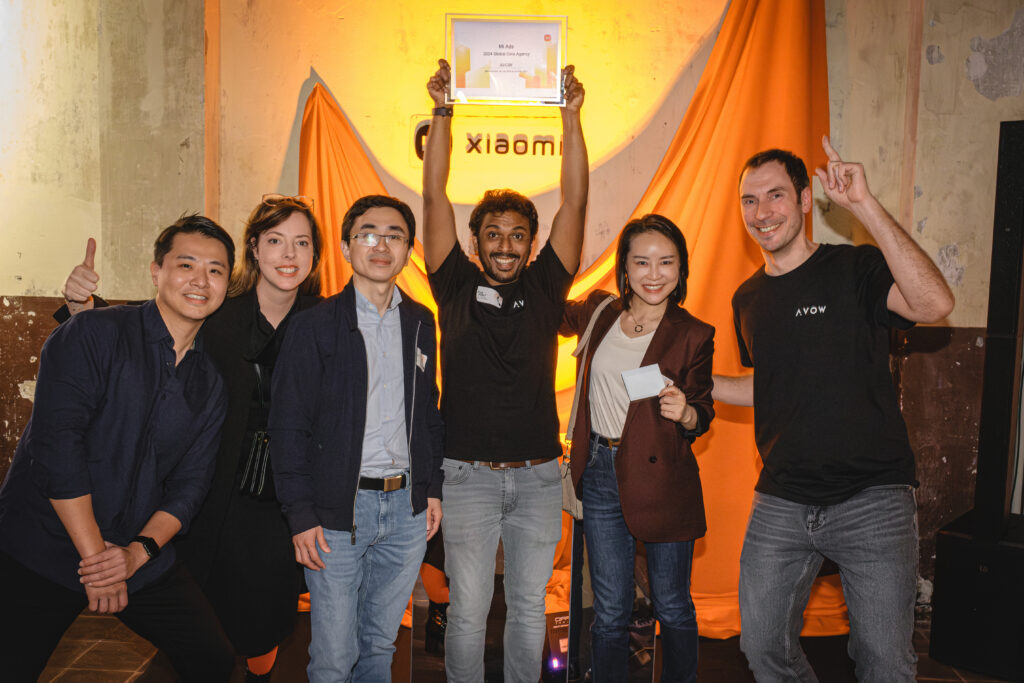
AVOW Welcomes Guenole Le Gall as Vice President of Client Strategy
Introducing AVOW's New VP of Client Strategy: Guenole Le Gall!
Guenole Le Gall has recently joined the AVOW team as the Vice President of Client Strategy, boasting an impressive track record of over two decades in the dynamic realm of mobile advertising.
Guenole's illustrious career includes founding Aiizo and holding leadership positions at Digital Turbine, Tempr, Mozoo Group, and others. His strategic acumen and international experience in sales, customer success, and partnership management make him a valuable addition to AVOW's leadership team.
In his new capacity as Vice President of Client Strategy, Guenole Le Gall is poised to lead AVOW's endeavors in elevating client satisfaction and fostering robust revenue growth. At the helm of the Client Services team, his mission is to provide clients with comprehensive support throughout their mobile business journey. From the initial stages of app launches to navigating the intricacies of mobile OEM advertising and optimizing user acquisition campaigns, Guenole's strategic vision will drive success for AVOW's clientele.
Remarks from AVOW's CEO Robert Wildner and Guenole Le Gall:
Robert Wildner, AVOW's CEO, expresses his enthusiasm for Guenole's appointment, stating, "We are delighted to welcome Guenole Le Gall to our leadership team. His extensive experience and expertise in mobile advertising and digital marketing align perfectly with AVOW's commitment to delivering exceptional value to our clients. Guenole's impressive background positions him as a cornerstone in our journey to transform our client strategy and maintain leadership in mobile OEM advertising."
Guénole is equally enthusiastic about his new role, remarking, "I'm honored to join AVOW and excited to deliver exceptional value to our clients and partners by leveraging my extensive network, knowledge, and global market experience. With our talented team, I'm confident we'll continue to lead and evolve the industry.”
Guenole Le Gall's arrival marks a pivotal moment for AVOW, bolstering its leadership team alongside the recent addition of Melissa Bohlsen as CMO. AVOW's leadership team is now poised to fortify its client-centric approach and sustain its leadership position, driving success for clients and partners alike in the rapidly evolving mobile advertising landscape.
Welcome to AVOW, Guenole!
The Pros and Cons of Sideloading and The Importance of Freedom of Choice
In this article, we’re stepping off the beaten path of app store monopolies and digital gatekeepers, to venture into the world of sideloading, with all its benefits and potential drawbacks. We’ll also look at how Fortnite, Alternative App Stores, and the Digital Markets Act (DMA) in Europe have disrupted the app distribution landscape, and why sideloading is a big part of this shift.
But First, What Exactly is Sideloading?
Sideloading, a term that might not immediately make sense, is an unconventional approach to app installation, involving the downloading and running of apps on devices from sources other than the official app store linked to the device’s operating system. For mobile marketers and developers, understanding the process is important to know how to leverage the benefits of sideloading and navigating the potential challenges.
How Fortnite Made the Epic Move to Sideloading - Bridging a Direct Connection with Users
The most publicized example of sideloading revolves around the popular game “Fortnite” on Android devices. In 2018, Epic Games, the brains behind Fortnite, chose not to distribute their game through the Google Play Store. This strategic move towards independence foreshadowed a clash with Apple a few years later when Fortnite was removed from the Apple App Store for allowing direct in-game purchases, bypassing Apple’s standard payment system and avoiding the 30% commission fee.
In response to breaking away from the Google Play Store, Epic Games offered Fortnite as a download from their official website, enabling users to sideload the application. By taking control of the distribution, they were able to maintain a direct relationship with their players and avoid the revenue share imposed on them by the two mainstream app stores. Fortnite’s sideloading approach drew attention within the mobile gaming community towards the potential of alternative app distribution.
The Pros of Sideloading
- Expand Your App Availability: Sideloading broadens the reach of your application, going beyond the big app stores and into diverse user bases.
- Direct User Engagement: Through sideloading you can directly engage with users, turning them into a valuable feedback community. This not only helps in shaping your app to match their preferences but also facilitates beta testing, enabling early feedback and improvements before releasing your app to a wider audience.
- Independence from App Stores: As proven by the Fortnite example earlier in this article, sideloading liberates app developers from the constraints of app store policies, allowing much greater independence and flexibility.
- Bypass Geographical Restrictions: In some cases, app stores have limitations that prevent users in specific regions from accessing your app. Sideloading breaks down these geographic barriers so people from any corner of the globe can download and enjoy your app. This opens up your app’s reach to a diverse and international audience.
- Cost Savings and Freedom from Fees: As highlighted by the Fortnite example we mentioned earlier, sideloading offers a financially advantageous path by sidestepping the fees typically associated with app stores. A win-win situation that benefits mobile developers with higher revenue potential, while potentially offering more budget-friendly options for users.
The Cons of Sideloading
- Security Risks: Sideloading could expose devices to security risks since apps installed via unofficial sources may not undergo the same rigorous security checks as those from official app stores.
- Device Compatibility Issues (although not for much longer): Not all devices can sideload apps. For instance, iPhone users can only sideload apps using jailbreak on their iOS devices - but with the passing of the Digital Marketing Act in Europe, sideloading will be possible on all smartphones.
- Lack of Updates and Support for Users: Sideloaded apps may not receive regular updates or official support, leading to a poor user experience due to outdated or unsupported software.
- Legal and Copyright Concerns: Sideloading apps that infringe on copyrights or intellectual property can lead to legal issues for both developers and users.
- Loss of App Store Benefits: Sideloading bypasses the benefits of app stores, such as centralized updates and user reviews - meaning developers could face challenges maintaining their apps and establishing credibility among their users.
Looking at the mobile app industry as a whole, the advantages outweigh the risks.
Thankfully, viable alternatives to Google and Apple's app store monopoly are already in existence, offering mobile developers the flexibility and freedom they desire, even beyond sideloading. As underscored by AVOW's CEO Robert Wildner in this article, Mobile app developers can reclaim their freedom of choice with alternative app stores.
Future Developments: Sideloading and the DMA in Europe
Sideloading may become more prevalent in 2024, due to the significant impact the Digital Markets Act (DMA) will have in Europe. What’s the DMA? In short, the European Commission identified six major tech companies including Apple and Alphabet (Google) as gatekeepers and they will have six months to align with DMA directives once they have been designated. Failure to do so could lead to lofty fines, such as up to 10% of the company’s global turnover and 20% for repeated offenses.
This regulatory shift sharpens the focus on freedom and freedom of choice for both users and app developers. Exciting times lie ahead...
Alternative App Stores and Freedom of Choice
It's evident that freedom of choice thrives through Alternative App Stores (AAS) - the app stores of Original Equipment Manufacturers (OEMs), such as Xiaomi, Oppo, Vivo, Huawei, and Transsion - but how did this come into existence?
In the past, when users were limited to Google Play on Android devices and the Apple App Store on iOS, which restricted their options, sideloading emerged as a workaround. But installing apps from unofficial sources introduced security risks, which in turn prompted the need for safer alternatives - so OEMs responded by establishing their own app stores.
This alternative method of app distribution, which has become more mainstream in recent times, strikes a balance between user empowerment and device security - reshaping the app landscape as we know it.
If you're interested in exploring these alternative app distribution methods check out our comprehensive Mobile OEM Guide for detailed strategies and practical tips.
AVOW's Mobile OEM Advertising Guide 📲 Free Download

